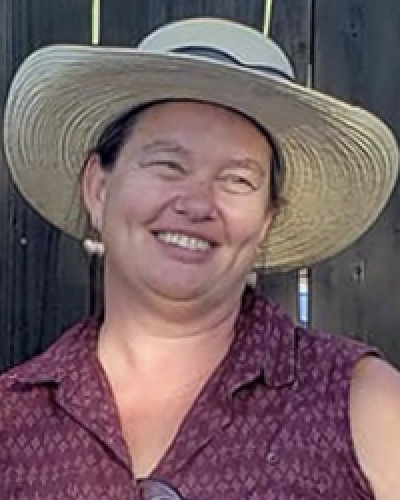Correy McAtee (Prineville) is a certified and professional sheep shearer who raises heritage Romeldales, other breeds of sheep, and lamb for wool, dairy, and breeding stock for her business, Custom Colored Critters. McAtee is a 3rd generation farmer who grew up in Oakridge, Oregon on a cattle, timber, and sheep farm.
Bio
Correy McAtee is a certified and professional sheep shearer and has been shearing since her early 20s, in the late 1990s. She also shears heritage Romeldales, other breeds of sheep, goats, alpacas, llamas, and the odd pony or donkey. McAtee also raises lambs for breeding stock and generally lambs in early to mid-winter. She shears her own sheep in the late fall so that the ewes have some regrowth before the harshest days of winter arrive. She shears for others in April-May, which seems to be pretty standard for Oregon sheep shearers. After her parents sold the family farm in Oakridge, OR, McAtee found herself sheepless. While she eventually purchased a few sheep a few years later, she honed her own shearing skills in a number of ways—working on the lambing crew at Oregon State University, the year she spent managing a large commercial flock in Virginia, and then, after 13 years of shearing, she attended a sheep shearing school in Washington state. She mentions several mentors along the way: "There was [Johnny] a wonderful shearer in Virginia who sheared the flocks for us, he had a shearing trailer and wool press (the first I’d seen). He taught me the elemental basics of holding the sheep, and the pattern. . . I couldn’t tell you how good of a shearer he was, but he got the job done, and sparked a lifelong affliction." Others include Washington school instructors Mike McWilliam, who "is legendary in the industry, and Jerry Richardson [who] is a wizard with the mechanics . . . and sharpening the gear." She also mentions Clint Goodwin, who first took her out on the shearing circuit and taught her to shear alpacas, as well as Pierre Monnat and Jake Valentine. As McAtee tells it, every day of shearing is different, and she's sheared at 7-10 different farms in a day. She explains, "Some farms have to have us set up and move 2-3 different times. Sometimes we shear on plywood, or on a tarp, a front porch, concrete slab, or in the dirt. Sometimes in the shade, or the wind, or out in the sun. Sometimes we have to cancel because of rain or snow. Sometimes the animals aren't caught, or escaped before we get there. We'll deal with different breeds, different wool types, different sizes, different species: sheep, goats, alpacas, llamas, the odd pony or donkey." It’s a rare farm that has most of its sheep all "the same size and kind, which allows you to develop a rhythm and style to get that repeatable set of blows [strokes]." Despite the hardships, Correy McAtee loves her work, and she enjoys still learning and sharing her knowledge, both formally and informally. "I go back to the Washington shearing school and help teach there. When I can I attend advanced schools/clinics with industry leaders, and when shearers manage to rendezvous, there is always exchanges of tips and techniques, as well as tall stories."


